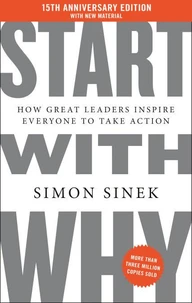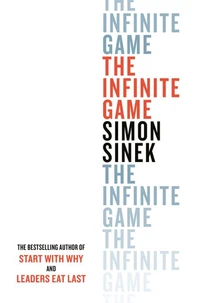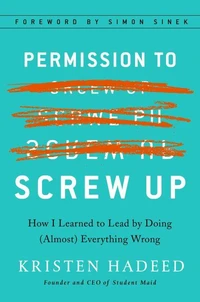Leaders Eat Last. Why Some Teams Pull Together and Others Don't
Par :Formats :
- Paiement en ligne :
- Livraison à domicile ou en point Mondial Relay estimée à partir du 17 décembreCet article sera commandé chez un fournisseur et vous sera envoyé 15 jours après la date de votre commande.
- Retrait Click and Collect en magasin gratuit
- Livraison à domicile ou en point Mondial Relay estimée à partir du 17 décembre
- Réservation en ligne avec paiement en magasin :
- Indisponible pour réserver et payer en magasin
- Nombre de pages350
- PrésentationBroché
- FormatGrand Format
- Poids0.293 kg
- Dimensions13,4 cm × 20,3 cm × 2,7 cm
- ISBN978-1-59184-801-1
- EAN9781591848011
- Date de parution23/05/2017
- ÉditeurPortfolio
Résumé
In his travels around the world, Simon Sinek, the New York Times bestselling author of Start with Why, noticed that some teams trust each other so deeply that they would literally put their lives on the line for each other. Other teams, no matter what incentives were offered, were doomed to in-fighting, fragmentation and failure. Why ? The answer became clear during a conversation with a Marine Corps general when Sinek asked, "What makes the Marines so good ? " "Officers eat last," the general replied.
Sinek saw it firsthand. The most junior Marines ate first, while the most senior Marines took their place at the back of the line. What's symbolic in the chow hall is deadly serious on the battlefield : Great leaders will sacrifice their interests for the good of those in their care. Today's workplaces tend to be full of cynicism, paranoia and self-interest. But the best organizations foster trust and cooperation because their leaders build what Sinek calls a Circle of Safety.
When everyone feels they belong, all energies are devoted to facing the common enemy and seizing big opportunities. This is particularly important for our youngest employees. In this revised edition, Sinek further explores the challenge of leading Millennials. As a generation, they want to work somewhere with a sense of purpose - they want to make an impact. But unless their organizations build a Circle of Safety, Millennials will struggle to find what they are looking for.
The fascinating research and true stories in this book prove that leaders who are willing to eat last are rewarded with deeply loyal, inspired and effective colleagues. It's amazing how well it works.
Sinek saw it firsthand. The most junior Marines ate first, while the most senior Marines took their place at the back of the line. What's symbolic in the chow hall is deadly serious on the battlefield : Great leaders will sacrifice their interests for the good of those in their care. Today's workplaces tend to be full of cynicism, paranoia and self-interest. But the best organizations foster trust and cooperation because their leaders build what Sinek calls a Circle of Safety.
When everyone feels they belong, all energies are devoted to facing the common enemy and seizing big opportunities. This is particularly important for our youngest employees. In this revised edition, Sinek further explores the challenge of leading Millennials. As a generation, they want to work somewhere with a sense of purpose - they want to make an impact. But unless their organizations build a Circle of Safety, Millennials will struggle to find what they are looking for.
The fascinating research and true stories in this book prove that leaders who are willing to eat last are rewarded with deeply loyal, inspired and effective colleagues. It's amazing how well it works.
In his travels around the world, Simon Sinek, the New York Times bestselling author of Start with Why, noticed that some teams trust each other so deeply that they would literally put their lives on the line for each other. Other teams, no matter what incentives were offered, were doomed to in-fighting, fragmentation and failure. Why ? The answer became clear during a conversation with a Marine Corps general when Sinek asked, "What makes the Marines so good ? " "Officers eat last," the general replied.
Sinek saw it firsthand. The most junior Marines ate first, while the most senior Marines took their place at the back of the line. What's symbolic in the chow hall is deadly serious on the battlefield : Great leaders will sacrifice their interests for the good of those in their care. Today's workplaces tend to be full of cynicism, paranoia and self-interest. But the best organizations foster trust and cooperation because their leaders build what Sinek calls a Circle of Safety.
When everyone feels they belong, all energies are devoted to facing the common enemy and seizing big opportunities. This is particularly important for our youngest employees. In this revised edition, Sinek further explores the challenge of leading Millennials. As a generation, they want to work somewhere with a sense of purpose - they want to make an impact. But unless their organizations build a Circle of Safety, Millennials will struggle to find what they are looking for.
The fascinating research and true stories in this book prove that leaders who are willing to eat last are rewarded with deeply loyal, inspired and effective colleagues. It's amazing how well it works.
Sinek saw it firsthand. The most junior Marines ate first, while the most senior Marines took their place at the back of the line. What's symbolic in the chow hall is deadly serious on the battlefield : Great leaders will sacrifice their interests for the good of those in their care. Today's workplaces tend to be full of cynicism, paranoia and self-interest. But the best organizations foster trust and cooperation because their leaders build what Sinek calls a Circle of Safety.
When everyone feels they belong, all energies are devoted to facing the common enemy and seizing big opportunities. This is particularly important for our youngest employees. In this revised edition, Sinek further explores the challenge of leading Millennials. As a generation, they want to work somewhere with a sense of purpose - they want to make an impact. But unless their organizations build a Circle of Safety, Millennials will struggle to find what they are looking for.
The fascinating research and true stories in this book prove that leaders who are willing to eat last are rewarded with deeply loyal, inspired and effective colleagues. It's amazing how well it works.














